 1 / 13
1 / 13

 1 / 13
1 / 13

Murat Abbas is both a successful professional and a unique music enthusiast. As time went by, he chose to abandon his career in consulting and finance to work for his passion for music, and he continues to share his extraordinary knowledge in the field on various platforms. We have dived into a deep and enriching conversation with Abbas in the magical world of vinyl records.
How and when did your passion for music emerge? How did your taste evolve in time?
As I come from a family of music enthusiasts, I grew up with the Turkish music of the 70s and 80s. My taste began to evolve around middle school also thanks to the great programs on TRT Radio. My musical knowledge developed with Sebla Özveren’s program on TRT 3, broadcasted every Tuesday, Wednesday, Thursday and Friday at 5.12 pm. And then there was Engin Arman’s program at 10.12 pm. To be honest, TRT Radio has been one of the most important institutions shaping my musical taste. I spent my younger years listening to Grunge from America and Madchester from Manchester, England. Once upon a time I also went through a Metalhead period as most of us did. I still enjoy the genre.
You have abandoned your career in consulting and finance to explore several areas including radio programming, DJ’ing and music writing; and you succeeded in all of them. Can we hear more about this adventure?
I have a past in consulting at Coopers & Lybrand, or today’s PricewaterhouseCoopers. There I became the person in charge of the home and office parties as I was the number one music enthusiast around; this is how my DJ’ing adventure took off. The parties gradually evolved into radio programs; I began to make a two-hour long dance/electronic music program on Radio Cool on a weekly basis. I had my first experience as a venue DJ at one of the parties this station organized at Taksim Twenty. Then I became a busy radio programmer: I worked for FG, Radio Cosmos, Radyo Eksen and Radyo Babylon. I also began hardcore DJ’ing. We organized our first 80s party at Babylon Asmalımescit in late 1999 and they wanted it to become a monthly event. I named it ‘Oldies But Goldies’. With its seventeenth season in completion, it’s the only party in the world that has been around for so long. On the other hand, music writing came after the radio and DJ’ing; I worked as the editor of Zip Istanbul magazine, the editor of the music section of IKSV’s portal ‘istanbuldostlari.org’, the music writer at Vatan Newspaper and the music editor of Trendsetter. Finally in 2001, I quit my professional career to enter the music industry. After radio programming and Radar Live festivals with Dinamo FM followed by event management at MTV Turkey, I began to work for Babylon/Pozitif in 2009 with Ahmet Uluğ’s offer. We organized important festivals including Rock’n’Coke, Mono and Istanbul Calling as well as several stadium concerts by artists ranging from Rihanna to Iron Maiden. Since 2014, I have been working as the General Director of Zorlu PSM.
For every music enthusiast there are some musicians with a special place in their lives. And for you, which ones are they?
That’s a difficult question; there are so many names. But I’m a huge fan of The Cure. They are the soundtrack of my youth. I first listened to them in 1981 and fell in love with them. I have every one of their albums and singles, and I attend their concerts everywhere I can. I can also mention David Bowie and Patti Smith. And the Turkish ones, I love MFÖ; Selda Bağcan, Cem Karaca, Barış Manço, Erkan Oğur… I also enjoy more recent bands like Duman, Athena and Mor ve Ötesi. But my general taste focuses heavily on foreign music.
Which musical genres are featured in your collection? Does it encompass specific periods, categories or artists?
I can talk about a variety of parameters. I intend to collect the entire discography of some like The Cure and Patti Smith. I try to collect every record by the most important, leading artists regardless of my like or dislike for them. In terms of period, I love the music of the 80s. My biggest fear in life has been to get bored of listening to and playing 80s music one day. Never happened. Even in the office, I listen to 80s radios on the internet whenever I get the chance. I also enjoy collecting records from that decade. I have a very good electronic music archive; I’m very confident in it. I don’t think there is anyone else in Turkey with an archive of comparable scale or scope; it’s unique even in international terms. My Alternative/Indie collection is also good. 90s, Soul, Funk, Jazz… I began to focus more heavily on classical music in the last five, six years and I gradually began to grow self-confidence in that department as well. I have no other criteria; I try to collect and listen to the music I like.
Do you remember the first record you have bought?
Not the vinyl, but I remember the CD. It was a record by Steve Reich.
And the most unique?
The Cure’s Disintegration has been my number one album since 1989. For years, I lived with the fear of getting bored of listening to it. I listen to it very often; my hand keeps reaching out for it. If they sent me to Mars and allowed me to take only one album with me, that would be Disintegration.
How many albums are there in the collection?
More than 6,000.
Did the family have a record collection? Or did you begin from scratch?
Unfortunately, I wasn’t aware of how valuable the vinyl record was when it was in its heydays. There was a considerable Turkish music archive coming from my older sisters; it somehow disappeared. Especially Turkish music has become so valuable nowadays…
It seems it became fashionable after the movie Issız Adam...
Definitely if we talk about Turkey. The mania that came immediately after the movie has never really subsided. Sadly, the Turkish vinyl record market is also a bit corrupt; sales figures emerge that go way beyond normal values, and you sometimes comply with them if you come across something you have been endlessly looking for…
“Sadly, the Turkish vinyl record market is also a bit corrupt; sales figures emerge that go way beyond normal values, and you sometimes comply with them if you come across something you have been endlessly looking for.”Are there any clubs, associations, etc. of record collectors in Turkey?
Not that I know of, but there are numerous record groups on Facebook. I’m a member of some of them. There are also channels worth following on Instagram.
Where do you buy your records from?
There is a great variety of sources, and these are different for the Turkish and the international markets. In Turkish music there are certain individual dealers. You may join Facebook groups and participate to their auctions. A record bazaar is set up every weekend in Feriköy. Some records emerge from homes in Anatolia; they may sell them at very good prices out of need or lack of awareness. And some people buy them and put them on auction. It has become a serious commercial business; Turkish vinyl records became a commodity rather than objects of musical taste. Some collect everything they can when they can afford it and they cause the prices to skyrocket. The record’s musical story has no importance whatsoever. On the other hand, the banning of PayPal in Turkey made life quite difficult for collectors who buy records from the international market; now I can only hope to visit the record stores when I travel abroad. I visited most of the record stores all around the world, from Tokyo to Reykjavik, from Europe to America. I also attend the record fairs. I sometimes have to put up with serious costs by paying extra luggage or upgrading my airline ticket just to carry records. This is sick… I also buy a considerable amount of books on records and follow record magazines.
How about the most important fairs you regularly follow?
Very important fairs exist in the UK and the Netherlands. I can also recommend some in Cologne. But globally the most important one takes place in Utrecht twice a year, once in mid-April and once in mid-November. I attend it every year. It’s a genuine madness where four hundred, four hundred fifty thousand vinyl records from around the world come together. Although it officially lasts for two days, enthusiasts go there one day earlier and make acquisitions at higher prices before the event is open to the public. It’s a true battlefield, a very stressful environment. This is a very strange passion; you may end up losing your best friend if you attend the fair together. In the midst of so many records, you get into the ‘the best record is always in the neighboring box’ mood. You think, ‘I wish he leaves asap and I can check what’s in there’ for the person next to you browsing another box. When I first went there I couldn’t make sense of the Band-Aids most people had on their fingers. I asked why and someone said I would figure it out by the end of the day. And my fingers were really bleeding at the end of the day; the action referred to as ‘digging’ literally tears your fingers to pieces. On the second day and the years that followed, I always attended the fair with fingers bandaged in advance.
How would you describe the visitor profile?
From everywhere in the world… Japan, Brazil, India… Those who are chasing a single 45’, who bring their record players with them to listen to the records before acquisition, vendors cancelling deals at the very last minute, people quarrelling… Very interesting anecdotes and serious amounts of money. The 45’ single God Save the Queen
by Sex Pistols was sold at 19,000 pounds right before my eyes. If you are curious about vinyl records you have to experience this event. There you can meet many buyers and dealers and then stay in touch with them. And one of the favorite rituals is sitting down in the evening with the other buyers and browsing the records you have bought, asking each other who bought what and for how much…
“I visited most of the record stores all around the world, from Tokyo to Reykjavik, from Europe to America. I also attend the record fairs. I sometimes have to put up with serious costs by paying extra luggage or upgrading my airline ticket just to carry records. This is sick.”
Which cities should one visit as the leading markets for the records?
Some cliché names like London and New York come to mind first, of course; and they are great indeed. But for me, the number one place is Hamburg. Here, both the number of stores and the number of the specialized ones are very high. Then come Berlin, London, Amsterdam and New York. And I would recommend Reykjavik and Tokyo for the records that are not to be found everywhere in the world. These cities have a different inventory from the global mainstream.
Is there a vinyl record museum in the world?
Not that I know of.
And the collectors you admire?
For a record enthusiast, buying and listening to records is a never ending pursuit. You can never get enough of it. I follow some global collectors with admiration thanks to the internet. For instance, there is a Dutch collector who has been a DJ for twenty years and he also organizes the Loveland festival in Amsterdam; he has a very good archive of twenty thousand records. According to a pre-nup agreement with his wife, he is allowed to keep only five thousand records at home; the remaining fifteen thousand are kept in another house. In Turkey, on the other hand, Zihni Müzik has the best archive both in terms of quantity and depth.
Why do some people who are only after the revenue and not interested in the music still choose to collect records? Why don’t they prefer collecting something else that is more profitable?
The hysteria for vinyl records did not only emerge in Turkey; it also became fashionable abroad. Record factories that closed down years ago are currently trying to re-open. A giant firm like Sony plans to open a record factory in Japan. If you are an artist and you want to release a vinyl record version of your album, you have to go to one of the very few factories and wait in line. It can take as long as three, four months… So it has a prestige element as well.
It appears as if this is both part of the Vintage movement and the result of the nostalgia for the quality of the analog sound…
Partly, but a global research finding tells another story. Comparing the number of records sold and the number of record players sold, it turns out that some people who possess no record player still keep records at home as an object of desire. It’s cool to hold a vinyl record while you’re sitting at a café; publishing it on Instagram, showing it to your friends… So we can’t explain the phenomenon with sound quality alone; those who obsess with the latter are already enthusiasts like us, anyway.
Indeed, in the last few years we have been seeing the LP formats of newly released albums on the shelves alongside new record players with the USB port…
Another complicated issue. Some records we refer to as new releases are digital recordings later converted to vinyl. Particularly in the 90s when the CD was the dominant format, very few albums had vinyl versions. Except for Jazz, the majority of the new vinyl prints of albums from the 90s, nearly from all genres, are converted from CD. In other words, the sounds aren’t analog and many new enthusiasts aren’t aware of it. However, a great majority of older vinyl records are analog prints; that’s why those from the 70s and 80s are more valuable. What is more, not every vinyl record is necessarily high quality in terms of sound. Different qualities exist. In terms of player technology, on the other hand, a vinyl listener never uses equipment with a USB port. You have bought a vinyl record already. Why would you want to digitalize it? They still prefer using thirty, forty-year-old record players from old factories, like the legendary Technics 1210. But at the end of the day, it is positive that so many new records are being printed and players being produced; the more people they reach, the happier I am.
“For me, the only advantage of PayPal’s absence has been that I was able to brace myself; otherwise I was out of control. You can buy any record anywhere in the world right from where you are seated; that’s extremely dangerous!”
How do you archive your collection?
Several mobile phone apps are available. My wife uploaded my entire archive inventory on one such software. As I can’t memorize everything in my current collection, I risk buying the same item twice or not buying an item thinking I already have it but I actually don’t. Now I can overcome this problem by accessing the inventory, double checking it.
Can vinyl records be conserved or restored?
If the record has a deep scratch sort of damage, it’s impossible to repair it, unfortunately. But it’s possible to get rid of the so called surface noise particularly present in the older recordings. Certain kinds of equipment that wash the records with special solutions are available abroad; you may buy their home versions as well. There is also one place in Istanbul that can do it; the noise reduction level can be up to seventy percent.
Do such damages affect the record’s value?
Of course. Even if you buy them online, records carry some condition codes. They have categories like mint, near-mint, very good, good plus, or excellent. The condition of the cover and the vinyl record are rated separately. Ratings out of ten, like cover-7, condition-8, can be provided as well. For instance, due to damages and scratches, within a period of two weeks I received four different price offers ranging between 1300 and 2000 TL for Fikret Kızılok’s record
Zaman Zaman, although it was the same print edition of the same record. And I eventually acquired one.
Can vinyl records be fake or pirate?
It’s not really feasible to produce a pirate vinyl record like you produce a CD; there is no vinyl printing available in Turkey anyway. There are places that do so abroad. But followers can tell the difference. You gradually learn all the nuances. In short, I can say there is no such thing as a pirate vinyl record.
You said you also collected CDs…
CDs came into my life in the 90s. I have an archive of 3500-4000 items. In early 2000s I turned to collecting vinyl records. I began to buy the vinyl versions of the albums I already had in CD. But at that point, another problem emerges; while you collect the vinyl versions of the CDs you already have, you also have to buy the newly released albums in vinyl. It’s a question of time, energy and budget. I currently don’t buy as many CDs. CD is still the dominant medium for Jazz albums and compilations, for they seldom print vinyl for them.
Do you play a musical instrument or compose music?
Sadly, I have never had the opportunity to learn to play an instrument. But it’s never too late for me. I will certainly find an occasion to experience the production side. People around me already expect me to do so.
“I get goose bumps even at hearing the words ‘donating records’; the idea of leaving my records while I’m still alive… That’s impossible. If I ever had a child or children in the future, I would definitely like to pass the collection and my enthusiasm on to them.”
Your recommendations for those who want to start collecting records?
A record should be taken as an instrument to listen to at any moment in life, and not merely as a commodity. So they should first make sure music has a crucial place in their lives and they should love it. The record and the music should not be separated. Then they should follow the internet, books and magazines. Record Collector is a key publication. And
discogs.com is a key website. I hear that PayPal will be available again in Turkey within eighteen months. For me, the only advantage of its absence has been that I was able to brace myself; otherwise I was out of control. You can buy any record anywhere in the world right from where you are seated; that’s extremely dangerous!
And for Turkey?
They have to visit Zihni Müzik. If they regularly follow a few stores like Kontra Records, Plakhane and Groove Müzik, they can make wiser choices thanks to the relationships they develop with the store owners. They absolutely have to watch their budget; I highly recommend it as a victim. At a record shop at the fair in the Netherlands, they told me to carry a fixed amount of cash in my pocket and then never, never start visiting the ATM machine nearby. I would also recommend them to collect older, analog prints. As I explained earlier, they have to be especially careful with the 90s albums.
Do you share your collection with others? Have you ever exhibited it or done a DJ set based on it?
We have a small group with Yekta Kopan, Kanat Atkaya and Görgün Taner. Every two or three months we gather at the place of one of us and do a vinyl night. We only listen to records and talk about music for four, five hours. We occasionally make show offs to each other. Then there is this series I have regularly been publishing on Instagram for many years, which I have been neglecting a bit since 2015; every morning I published a record selection titled ‘this is how I woke up this morning’, and expressed my mood through records. Here I also share teasers related to the bands and concerts we will be promoting. Regular followers are able to catch some of the clues. In the past, DJ sets were based on vinyl; we had arm injuries trying to carry the records around. With the digital revolution, this came to an end as well.
What would you like to do with your collection in the future? Would you ever consider donating it?
I get a goose bump even at hearing the words ‘donating records’; the idea of leaving my records while I’m still alive… That’s impossible. If I ever had a child or children in the future, I would definitely like to pass the collection and my enthusiasm on to them.
This interview is conducted by İpek Yeğinsü on behalf of Art50.net for TEB Private.



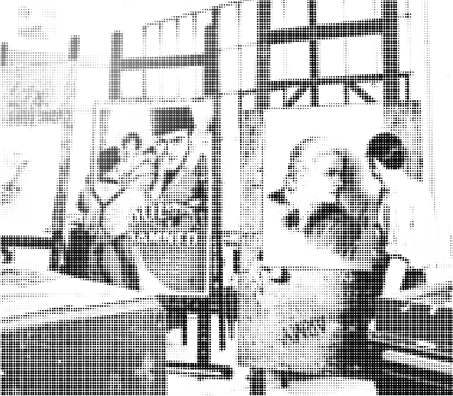



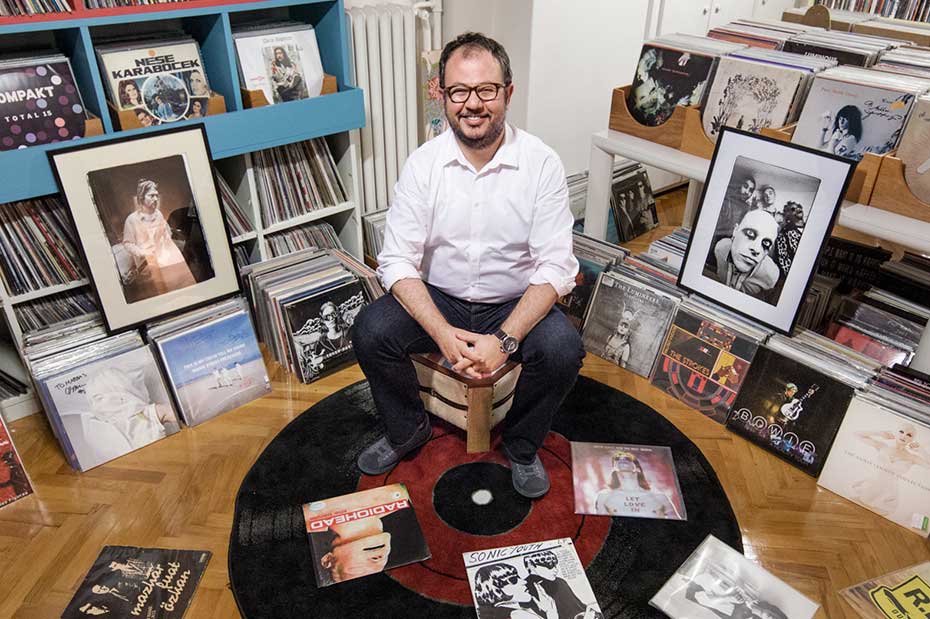
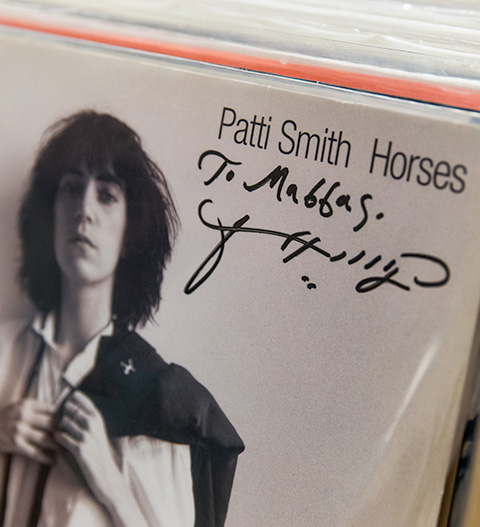
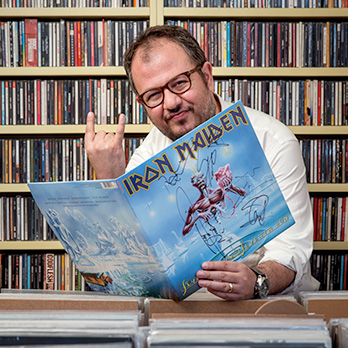

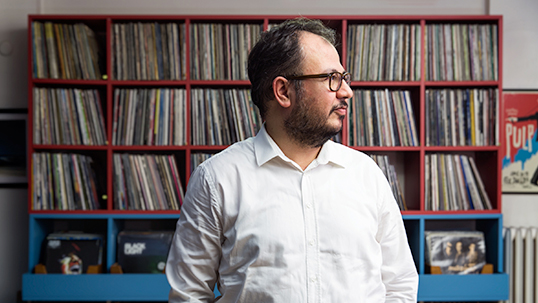
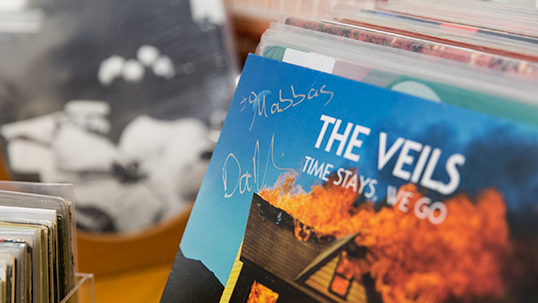
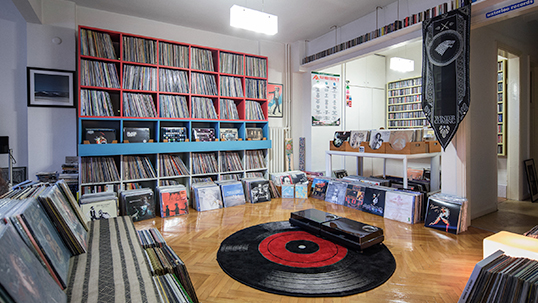
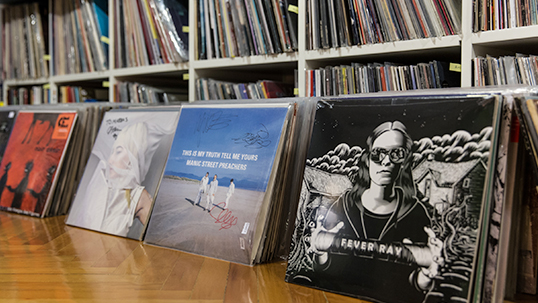
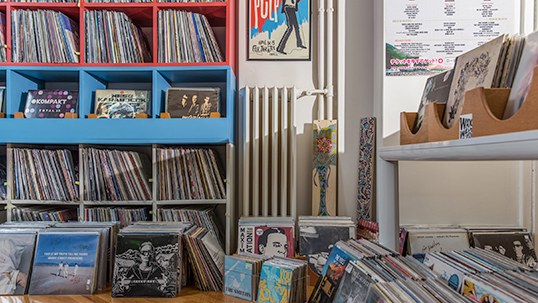
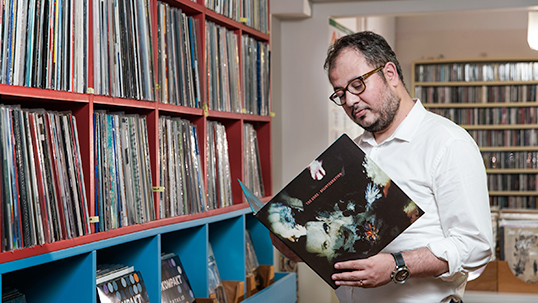
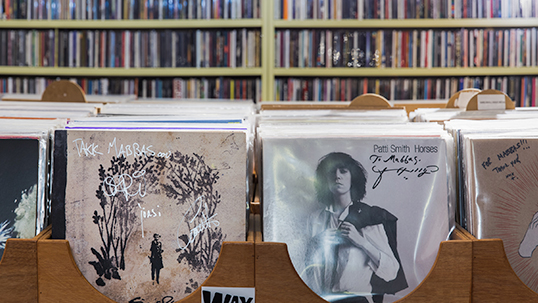
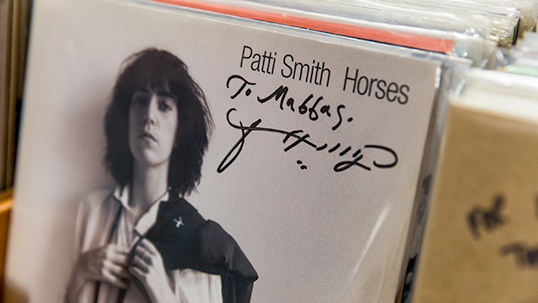
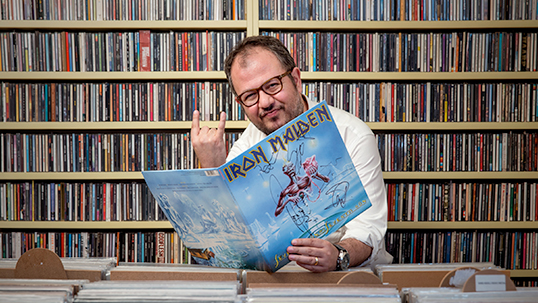
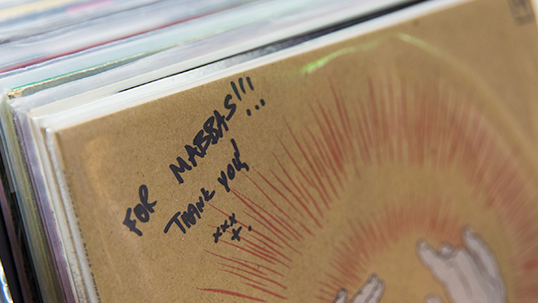

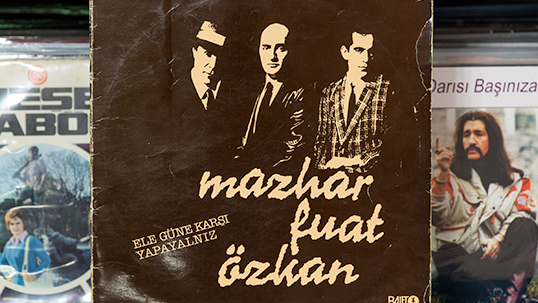
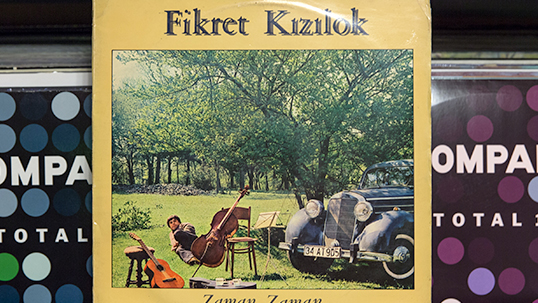


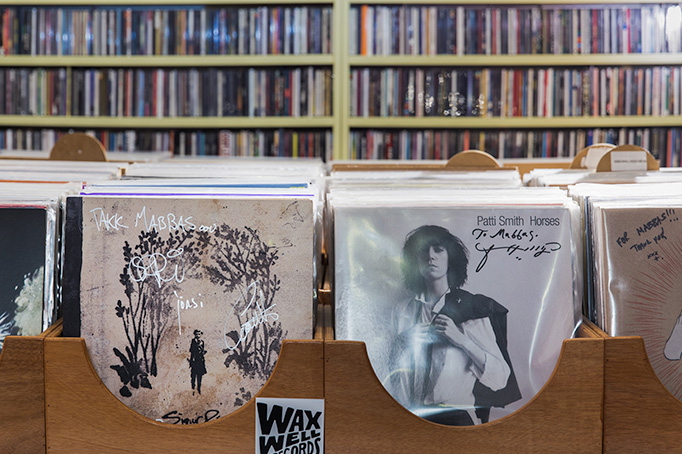
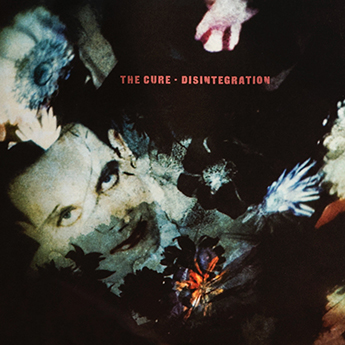
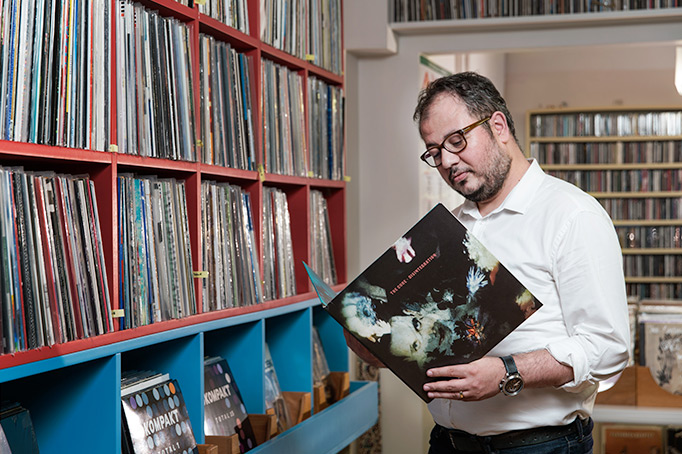
 UP
UP


